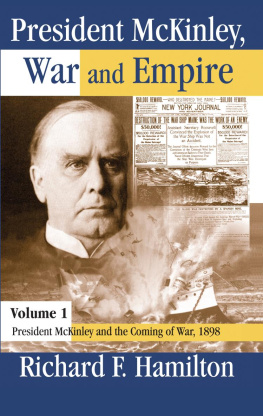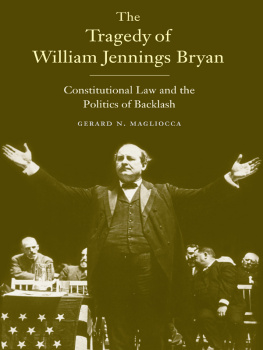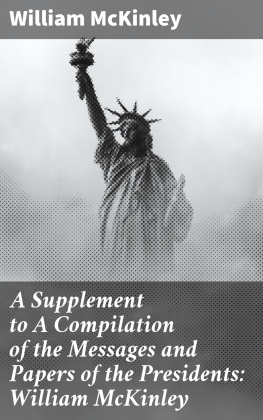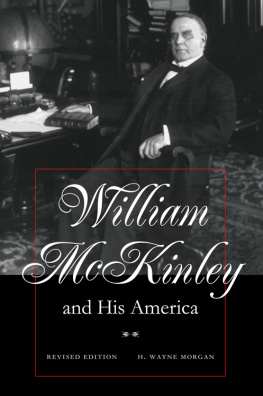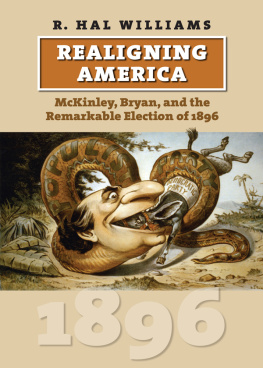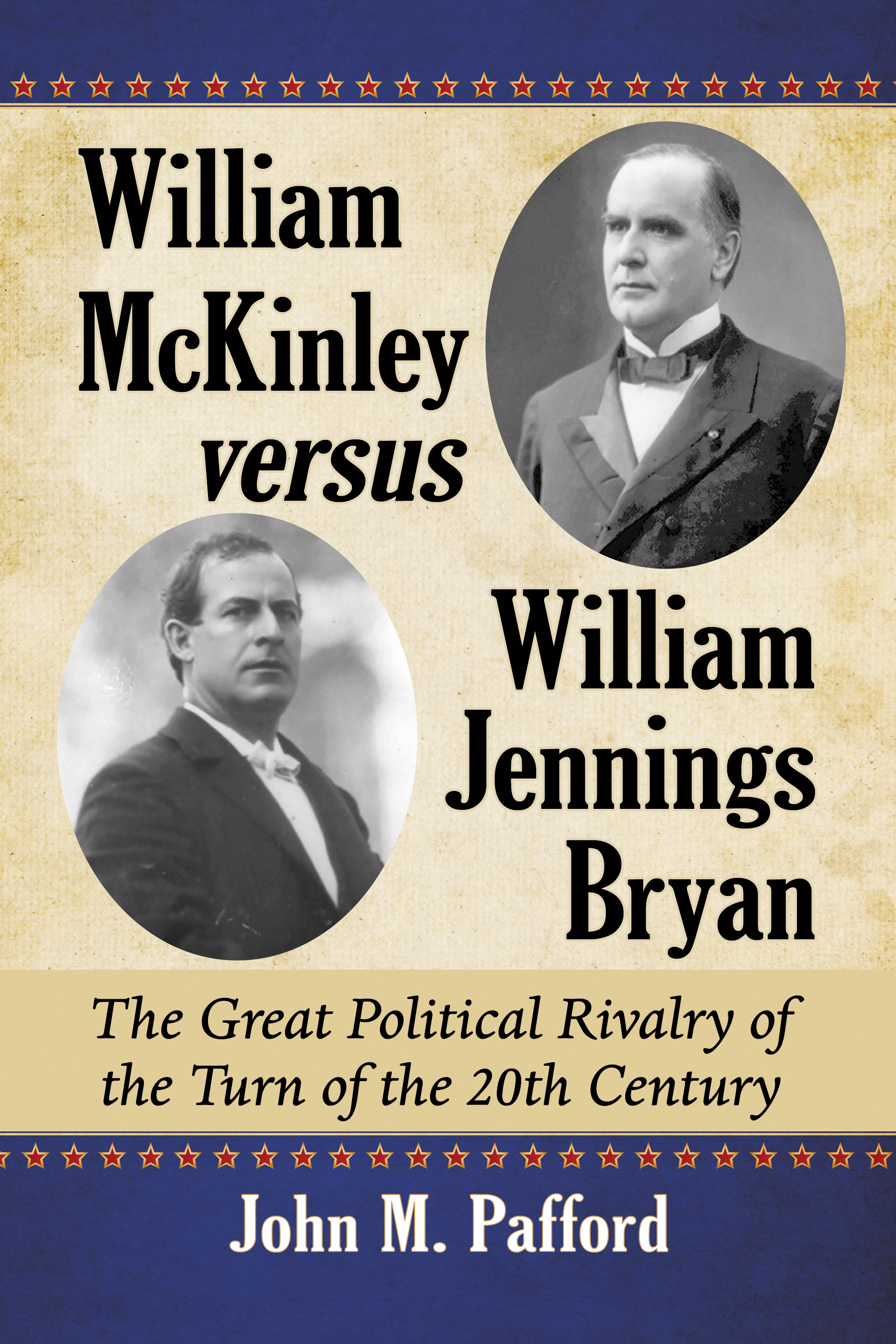William McKinley versus William Jennings Bryan
William McKinley versus William Jennings Bryan
The Great Political Rivalry of the Turn of the 20th Century
John M. Pafford

McFarland & Company, Inc., Publishers
Jefferson, North Carolina
Library of Congress Cataloguing-in-Publication Data
Names: Pafford, John M. (John Monroe), author.
Title: William McKinley versus William Jennings Bryan : the great political rivalry of the turn of the 20th century / John M. Pafford.
Other titles: Great political rivalry of the turn of the 20th century
Description: Jefferson, North Carolina : McFarland & Company, Inc., Publishers, 2020 | Includes bibliographical references and index.
Identifiers: LCCN 2020011066 | ISBN 9780786499755 (paperback : acid free paper) ISBN 9781476639352 (ebook)
Subjects: LCSH: McKinley, William, 1843-1901. | Bryan, William Jennings, 1860-1925. | PresidentsUnited StatesElection1896. | PresidentsUnited StatesElection1900. | United StatesPolitics and government1893-1897. | United StatesPolitics and government1897-1901. | Political campaignsUnited StatesHistory19th century.
Classification: LCC E710 .P34 2020 | DDC 973.8/8092dc23
LC record available at https://lccn.loc.gov/2020011066
British Library cataloguing data are available
ISBN (print) 978-0-7864-9975-5
ISBN (ebook) 978-1-4766-3935-2
2020 John M. Pafford. All rights reserved
No part of this book may be reproduced or transmitted in any form or by any means, electronic or mechanical, including photocopying or recording, or by any information storage and retrieval system, without permission in writing from the publisher.
Front cover images: left to right William Jennings Bryan and William McKinley (Library of Congress)
Printed in the United States of America
McFarland & Company, Inc., Publishers
Box 611, Jefferson, North Carolina 28640
www.mcfarlandpub.com
To the memory of two flawed men who had the vision of a country rooted in Christian verities striving to be a beacon of order, justice, and freedom.
Table of Contents
Preface
For most of the 19th century, the foreign policy focus of the United States was on trade with other countries, but our projection of power was substantially more limited. There were border disputes to our north with the British in Canada and to our south with Spanish Mexico and later with the independent Mexico. There was little support from the American public, though, for the acquisition of territory beyond the northern hemisphere until the last decade of the century. By then, the United States was well established in the front rank of countries as far as economic strength and population were concerned, but our ability to protect our interests with armed forces had not kept up with that growth. The army was limited in size, concerned with coast defense and frontier security against Indians. Its growth in size and power would not come until 1898. By the mid1880s during Chester Alan Arthurs Administration, the navy began its slow revival from the doldrums of the postCivil War years; during those years, it had sunk from being second only to the British navy during our Civil War to being of limited significance even as a coast defense force and of virtually no use in protecting American interests and citizens beyond our shores. The growth in our population and wealth spurred determination to protect better our interests and citizens along with a developing focus on doing our part to expand for people in other parts of the world the order, justice, and freedom so vital to us. There was a slowly growing recognition that as this country grew stronger, there was a concomitant responsibility to help others learn and grow. As the century ended, the United States possessed a powerful navy, an army which had grown quickly in size and capability, and an impressive expansion of its power worldwide, now occupying territories of both strategic and economic significance. We now were too wealthy, too big in population, too strategically located in a world more interconnected to stand apart from overseas events even if we wanted to.
The key period lying ahead in most of the coming pages is the 1890s, a decade beyond the memories of readers, but not too far removed since many of us have known people whose recollections go back to the years of William McKinley and William Jennings Bryan. Almost we can touch this time.
Introduction
The 1890s were one of the most dramatic decades in American history, one which marked the rapid rise of the United States onto the world stage as a country with powerful armed forces and a significant empire beyond our borders primarily as a result of our victory over Spain in 1898. The American economy, already impressive, continued to grow. Although there were abuses which needed correction, the freedom in the economy produced more and more wealth improving the lives of most of our people and attracting immigrants in large numbers.
The 1896 and 1900 clashes between William McKinley and William Jennings Bryan rank among the most exciting and definitive in the history of American presidential campaigns. The differences between the conservative McKinley, nominee of the Republican Party, and the liberal Bryan, who burst suddenly on the national stage as the Democratic Party choice, were sharp, more pronounced than in preceding postCivil War elections when neither major party candidate was a big government, high tax, high spending liberal. Both men were devout Christians but drew substantially different conclusions concerning the domestic and foreign policy beliefs they based on that faith. Their personalities also were distinctly different; Bryan one of the most charismatic candidates in our political history, McKinley experienced and solid, but not exciting.
By the mid1890s, each man was the major figure in his party. McKinley was governor of Ohio after serving seven terms in the U.S. House of Representatives. During the Civil War, he had demonstrated initiative, courage, and leadership, rising to the rank of major by the age of 22. He was committed to the gold standard, believed in limited government and led more from behind the scenes than did the flamboyant Bryan who surged to control of the Democratic Party in 1896, both leading and riding the wave of discontent which swept aside the Cleveland conservatives who had led it until then. Under Grover Cleveland, the Democratic Party had been somewhat more conservative than the Republicans. The major depression of 1893 shook the confidence of many Democrats. When that was combined with Clevelands being a lame duck as his second presidential term neared its end and Bryans charisma, the way was opened for the party to shift course radically.
A former two-term member of the U.S. House of Representatives and a defeated candidate for the U.S. Senate in 1894, the 36-year-old Bryan was hardly a household name, but he was driven by a sense of destiny and by personal ambition. He came to the 1896 Democratic Party convention convinced that he would be their presidential nominee. His dramatic Cross of Gold speech galvanized the delegates, culminating with his soaring conclusion: You shall not press down upon the brow of labor this crown of thorns; you shall not crucify mankind upon a cross of gold. From relative obscurity, he shot to prominence, winning the nomination on the fifth ballot. Any possibility for a reasoned defense of the gold standard at the convention was swept away by the flood of enthusiasm for Bryan.


